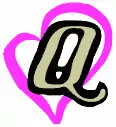UniQ Aotearoa
UniQ Aotearoa (UniQ) was Queer Students' Association of New Zealand, a collection of queer student groups at universities, polytechs and colleges of education in New Zealand.[1][2]

UniQ was active at most New Zealand universities and several polytechnics. The term queer was considered to had been reclaimed and was used by UniQ to acknowledge both gender and sexual diversity.[1][3] It was considered to be collective term for non-heterosexual and non-cisgender identities; inclusive but not exclusive to lesbian, gay, bisexual, transgender, takatāpui, intersex and asexual people.[1][3]
The name 'UniQ' comes from the name given to the work carried out by Matt Soeberg.[4] Soeberg was employed as a Queer Project Worker by New Zealand Union of Students' Associations (NZUSA) to address the needs of queer students.[4] The overall name given to the work was 'UNIQ - Creating Support for Lesbian, Gay, Bisexual and Transgender Students' which was eventually adopted by various student groups as their name.[4]
UniQ worked to promote education and understanding for and about queer students undertaking tertiary study and regular events held around New Zealand's tertiary institutions. This included Pride Week when local UniQs facilitate a week-long series of events usually culminating in a dance party.
Members
UniQ Aotearoa was made up of various local iterations of UniQ and other queer student groups at different universities and polytechs across New Zealand.[5]
| Name | University |
|---|---|
| UniQ Canterbury | University of Canterbury |
| Wintec UniQ | Waikato Institute of Technology |
| UniQ Auckland | Auckland University |
| OUT@AUT | Auckland University of Technology |
| UniQ Otago | Otago University |
| UniQ Waikato (formerly Askew - Waikato) | University of Waikato |
| UniQ Victoria | Victoria University of Wellington |
| UniQtec | Unitec Institute of Technology |
| UniQ Massey Wellington | Massey University |
| Massey UniQ Palmerston North | Massey University |
National Conferences
UniQ used to meet once annually at a national conference, starting from 1997.[6] Initially known as the Queer Youth and Students (UniQ) Conference, these conferences were opportunities for students across New Zealand to come together to discuss and address the wide range of current issues facing queer students.[7][8][9] These conferences usually included workshops, planning sessions and guest speakers (including political, religious and disabled speakers).[2][10][11][12][13][14]
| Year | University / Location | Host |
|---|---|---|
| 1997 | Massey University | Massey University Students' Association (MUSA)[7] |
| 1998 | Wellington[7] | New Zealand Union of Students' Associations (NZUSA)[7] |
| 1999 | University of Canterbury[8] | University of Canterbury Students' Association (UCSA)[8] |
| 2001 | Massey University | MUSA |
| 2002 | Otago University[9] | Otago University Students' Association (OUSA) |
| 2003 | Auckland University of Technology | Auckland Student Movement (AUSM) |
| 2004 | University of Waikato | Waikato Students' Union (WSU) |
| 2005 | Victoria University of Wellington[15][16][17] | Victoria University of Wellington Students' Association (VUWSA) and UniQ Victoria[17] |
| 2006 | Massey University[10][18] | MUSA[18] |
| 2007 | Auckland University and Auckland University of Technology[13][19] | UniQ Auckland and Out@AUT[13][19] |
| 2008 | Otago University[14] | OUSA |
| 2009 | Victoria University of Wellington[11][12] | UniQ Victoria[11][20] |
| 2010 | University of Canterbury[21][22][23] | UCSA |
| 2011 | University of Waikato[6] | Askew Waikato |
References
- "UniQ Aotearoa". 9 August 2014. Archived from the original on 9 August 2014. Retrieved 20 April 2020.
- "Welcome to University… Welcome to UniQ! » archived article sourced from GayNZ.com". www.pridenz.com. Retrieved 23 April 2020.
- "UniQ Aotearoa". www.facebook.com. Retrieved 23 April 2020.
- "Creating Support for Lesbian, Gay, Bisexual and Transgender Students". Salient. Vol. 59, no. 3. Victoria University of Wellington Students' Association. 4 March 1996.
- "Local Divisions". 13 January 2015. Archived from the original on 13 January 2015. Retrieved 20 April 2020.
- "NZUSA commends 25 years since HLRA". www.scoop.co.nz. 9 July 2011. Retrieved 20 April 2020.
- 1998 NZUSA Annual Report (PDF) (Report). New Zealand University Students' Association. 1999. Retrieved 21 April 2020.
- 1999 NZUSA Annual Report (PDF) (Report). New Zealand University Students' Association. 2000. Retrieved 21 April 2020.
- 2002 NZUSA Annual Report (PDF) (Report). New Zealand University Students' Association. 2003. Retrieved 21 April 2020.
- "National UniQ Conf. overcomes obstacles » archived article sourced from GayNZ.com". www.pridenz.com. Retrieved 20 April 2020.
- "UniQ Conference 2009". salientarchive.com. Retrieved 20 April 2020.
- "Gay Camp Review". salientarchive.com. Retrieved 20 April 2020.
- "¸,ø¤º°' UniQ Conference ¸,ø¤º°'". 11 October 2007. Archived from the original on 11 October 2007. Retrieved 20 April 2020.
- "GayNZ.com Students link up at UniQ Conference". 11 October 2008. Archived from the original on 11 October 2008. Retrieved 20 April 2020.
- "Cheap booze, Kylie and easy skanks!". www.scoop.co.nz. 16 June 2005. Retrieved 20 April 2020.
- "The UniQ fairy visits the AIDS Foundation". www.scoop.co.nz. 30 January 2006. Retrieved 20 April 2020.
- "UniQ's AJ Marsh » archived article sourced from GayNZ.com". www.pridenz.com. Retrieved 23 April 2020.
- 2006 NZUSA Annual Report (PDF) (Report). New Zealand Union of Students' Associations. 2007. Retrieved 21 April 2020.
- "Auckland to host annual UniQ conference » archived article sourced from GayNZ.com". www.pridenz.com. Retrieved 23 April 2020.
- "Guest editorial". salientarchive.com. Retrieved 20 April 2020.
- "Conference '10". 9 October 2011. Archived from the original on 9 October 2011. Retrieved 20 April 2020.
- 2010 NZUSA Annual Report (PDF) (Report). New Zealand Union of Students' Associations. 2011. Retrieved 21 April 2020.
- "Queer students converge on Christchurch » archived article sourced from GayNZ.com". www.pridenz.com. Retrieved 23 April 2020.